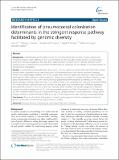| dc.contributor.author | Li, Yuan | en_US |
| dc.contributor.author | Croucher, Nicholas J | en_US |
| dc.contributor.author | Thompson, Claudette M | en_US |
| dc.contributor.author | Trzciński, Krzysztof | en_US |
| dc.contributor.author | Hanage, William P | en_US |
| dc.contributor.author | Lipsitch, Marc | en_US |
| dc.date.accessioned | 2015-06-02T12:20:36Z | |
| dc.date.issued | 2015 | en_US |
| dc.identifier.citation | Li, Yuan, Nicholas J Croucher, Claudette M Thompson, Krzysztof Trzciński, William P Hanage, and Marc Lipsitch. 2015. “Identification of pneumococcal colonization determinants in the stringent response pathway facilitated by genomic diversity.” BMC Genomics 16 (1): 369. doi:10.1186/s12864-015-1573-6. http://dx.doi.org/10.1186/s12864-015-1573-6. | en |
| dc.identifier.issn | 1471-2164 | en |
| dc.identifier.uri | http://nrs.harvard.edu/urn-3:HUL.InstRepos:16120922 | |
| dc.description.abstract | Background: Understanding genetic determinants of a microbial phenotype generally involves creating and comparing isogenic strains differing at the locus of interest, but the naturally existing genomic and phenotypic diversity of microbial populations has rarely been exploited. Here we report use of a diverse collection of 616 carriage isolates of Streptococcus pneumoniae and their genome sequences to help identify a novel determinant of pneumococcal colonization. Results: A spontaneously arising laboratory variant (SpnYL101) of a capsule-switched TIGR4 strain (TIGR4:19F) showed reduced ability to establish mouse nasal colonization and lower resistance to non-opsonic neutrophil-mediated killing in vitro, a phenotype correlated with in vivo success. Whole genome sequencing revealed 5 single nucleotide polymorphisms (SNPs) affecting 4 genes in SpnYL101 relative to its ancestor. To evaluate the effect of variation in each gene, we performed an in silico screen of 616 previously published genome sequences to identify pairs of closely-related, serotype-matched isolates that differ at the gene of interest, and compared their resistance to neutrophil-killing. This method allowed rapid examination of multiple candidate genes and found phenotypic differences apparently associated with variation in SP_1645, a RelA/ SpoT homolog (RSH) involved in the stringent response. To establish causality, the alleles corresponding to SP_1645 were switched between the TIGR4:19F and SpnYL101. The wild-type SP_1645 conferred higher resistance to neutrophil-killing and competitiveness in mouse colonization. Using a similar strategy, variation in another RSH gene (TIGR4 locus tag SP_1097) was found to alter resistance to neutrophil-killing. Conclusions: These results indicate that analysis of naturally existing genomic diversity complements traditional genetics approaches to accelerate genotype-phenotype analysis. Electronic supplementary material The online version of this article (doi:10.1186/s12864-015-1573-6) contains supplementary material, which is available to authorized users. | en |
| dc.language.iso | en_US | en |
| dc.publisher | BioMed Central | en |
| dc.relation.isversionof | doi:10.1186/s12864-015-1573-6 | en |
| dc.relation.hasversion | http://www.ncbi.nlm.nih.gov/pmc/articles/PMC4424882/pdf/ | en |
| dash.license | LAA | en_US |
| dc.subject | Genomic diversity | en |
| dc.subject | Pneumococcal colonization | en |
| dc.subject | RelA/ SpoT homolog | en |
| dc.title | Identification of pneumococcal colonization determinants in the stringent response pathway facilitated by genomic diversity | en |
| dc.type | Journal Article | en_US |
| dc.description.version | Version of Record | en |
| dc.relation.journal | BMC Genomics | en |
| dash.depositing.author | Croucher, Nicholas J | en_US |
| dc.date.available | 2015-06-02T12:20:36Z | |
| dc.identifier.doi | 10.1186/s12864-015-1573-6 | * |
| dash.contributor.affiliated | Thompson, Claudette | |
| dash.contributor.affiliated | Croucher, Nicholas J | |
| dash.contributor.affiliated | Hanage, William | |
| dash.contributor.affiliated | Lipsitch, Marc | |


